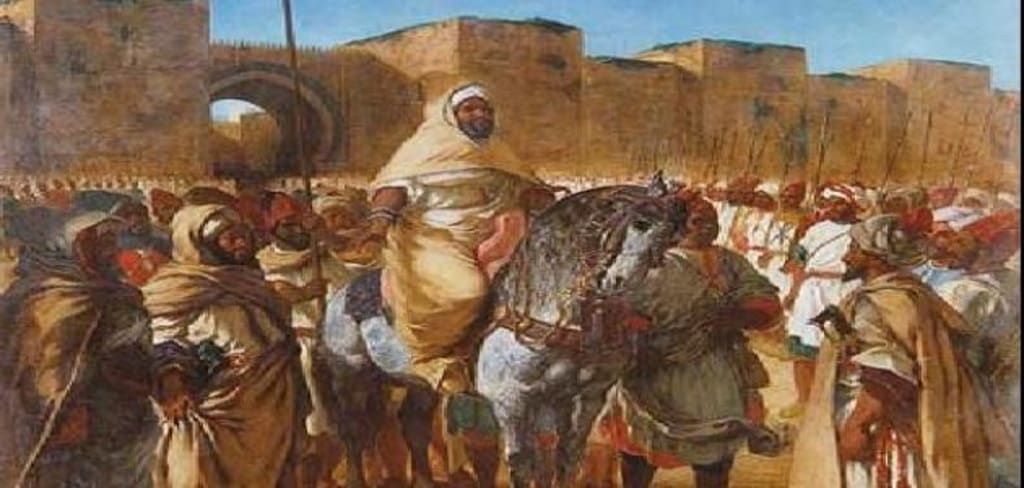The Almohad Caliphate
The Rise and Fall of a Medieval Islamic Empire

The Almohad Caliphate
The Almohad Caliphate was a medieval Islamic empire that ruled over much of North Africa and al-Andalus from the 12th to the 13th centuries. It was founded by the Almohads, a Berber tribe from the Atlas Mountains, who emerged as a powerful force in the region in the wake of the collapse of the Almoravid dynasty.
The Almohads were led by a charismatic religious leader named Muhammad ibn Tumart, who preached a message of religious reform and unity. He claimed to be the Mahdi, the promised one who would restore Islam to its true purity. Under ibn Tumart's leadership, the Almohads quickly gained a following among the Berber tribes of North Africa.
In 1147, the Almohads defeated the Almoravids in battle and took control of Morocco. They then turned their attention to al-Andalus, where they conquered most of the peninsula by the end of the 12th century.
The Almohads were a tolerant and inclusive empire. They allowed Christians and Jews to practice their own religions freely. They also promoted education and scholarship, and they built many mosques, schools, and libraries.
The Almohad Caliphate reached its peak under the reign of Abu Yusuf Yaqub al-Mansur, who ruled from 1184 to 1199. Al-Mansur was a brilliant military leader who led the Almohads to victory in several major battles against the Christians of Spain. He also built the famous Koutoubia Mosque in Marrakech, one of the most iconic landmarks in Morocco.
However, the Almohad Caliphate began to decline after al-Mansur's death. The empire was plagued by internal divisions, and it was eventually conquered by the Marinids in 1269.
Despite its relatively short existence, the Almohad Caliphate had a lasting impact on the region. It helped to spread Islam throughout North Africa and al-Andalus, and it promoted a culture of tolerance and learning. The Almohads also left behind a legacy of impressive architecture, including the Koutoubia Mosque, the Giralda Tower in Seville, and the Hassan Tower in Rabat.
The Almohads' Legacy
The Almohads left a lasting legacy on the region, both in terms of their political and religious influence. They helped to spread Islam throughout North Africa and al-Andalus, and they promoted a culture of tolerance and learning. The Almohads also left behind a legacy of impressive architecture, which can still be seen today in many cities across the region.
Political Influence
The Almohads were a powerful force in the region for over a century. They unified much of North Africa and al-Andalus under their rule, and they were a major threat to the Christian kingdoms of Spain. The Almohads also played a significant role in the Crusades, fighting against the Christians in several major battles.
Religious Influence
The Almohads were a devoutly religious people. They were followers of the Maliki school of Islamic law, and they promoted a message of religious reform and unity. The Almohads also built many mosques and schools, and they encouraged the study of Islam.
Cultural Influence
The Almohads were patrons of the arts and sciences. They built many beautiful mosques, palaces, and libraries. The Almohads also encouraged the study of mathematics, astronomy, and medicine.
The Almohads' legacy can still be seen today in many cities across the region. Their mosques, palaces, and libraries are reminders of their rich and vibrant culture. The Almohads also left a lasting impact on the region's political and religious landscape. They helped to spread Islam throughout North Africa and al-Andalus, and they promoted a culture of tolerance and learning.
The Almohads' Military Achievements
The Almohads were a formidable military force. They were skilled horsemen and archers, and they were well-organized and disciplined. The Almohads also had a strong navy, which allowed them to project their power across the Mediterranean Sea.
The Almohads' military achievements were impressive. They defeated the Almoravids in battle, and they conquered most of al-Andalus. The Almohads also fought against the Christian kingdoms of Spain in several major battles, including the Battle of Las Navas de Tolosa in 1212. The Almohads were victorious in this battle, which was a major turning point in the Reconquista.
The Almohads' military achievements helped to make them a powerful force in the region. They were a major threat to the Christian kingdoms of Spain, and they helped to spread Islam throughout North Africa and al-Andalus.
The Almohads' Decline
The Almohad Caliphate began to decline after the death of Abu Yusuf Yaqub al-Mansur in 1199. The empire was plagued by internal divisions, and it was eventually conquered by the Marinids in 1269.
There were several factors that contributed to the Almohads' decline. One factor was the death of al-Mansur, who was a brilliant military leader and administrator. Another factor was the rise of internal divisions within the empire. The Almohads were a diverse empire, and they were often divided along ethnic and tribal lines. These divisions made it difficult to maintain unity and stability.
The Almohads were also facing increasing pressure from the Christian kingdoms of Spain. The Christians were determined to retake al-Andalus, and they were slowly but surely making progress. The Almohads were unable to stop the Christian advance, and they eventually lost control of most of al-Andalus.
The Almohad Caliphate was a short-lived empire, but it had a lasting impact on the region. The Almohads helped to spread Islam throughout North Africa and al-Andalus, and they promoted a culture of tolerance and learning. The Almohads also left behind a legacy of impressive architecture, which can still be seen today in many cities across the region.
Conclusion
The Almohad Caliphate was a significant force in the medieval Islamic world. The Almohads were a devoutly religious people who promoted a message of reform and unity. They were also a powerful military force who conquered much of North Africa and al-Andalus. The Almohads left a lasting legacy on the region, both in terms of their political and religious influence.
About the Creator
Hmid Abderrahmane
Abderrahman hmid, 23, a skilled content writer with translation expertise. Experienced in journalistic translation across fields. Owns a collection of unpublished fiction and creative stories awaiting an online debut. Thanks!






Comments
There are no comments for this story
Be the first to respond and start the conversation.